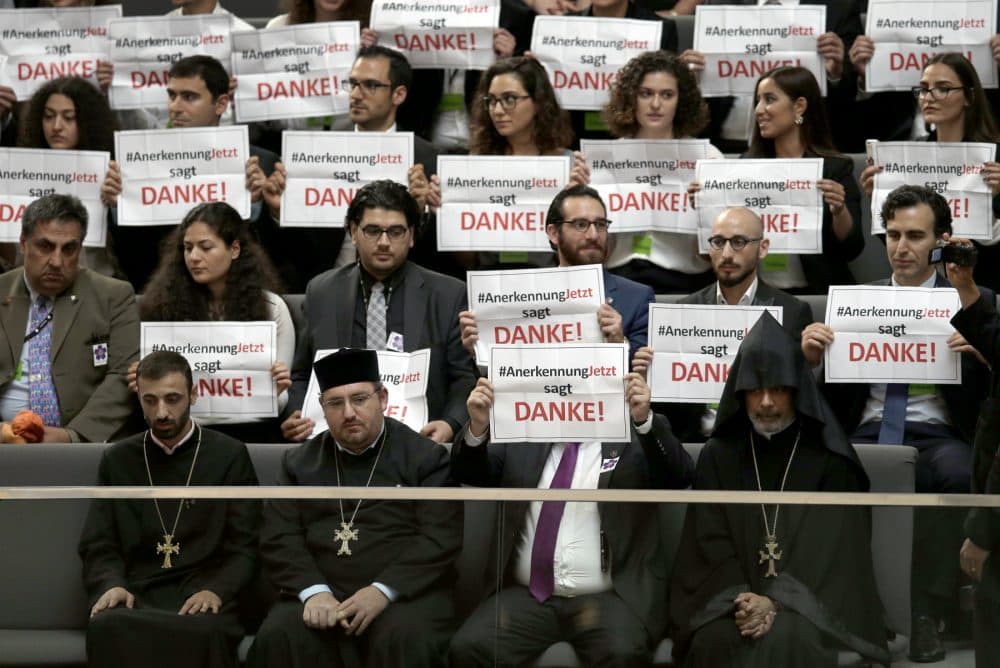Advertisement
Though The Heavens May Fall: It's Time To Recognize The Armenian Genocide

Between 1915 and 1916, the Turkish government of the Ottoman Empire orchestrated the murder of approximately 1 to 1.5 million Armenians in what was to become the 20th century’s first genocide.
Earlier this month, the Bundestag, Germany’s Parliament, officially recognized the Armenian Genocide, joining more than two dozen other nations that have already done so. The decision deeply angered the Turkish government, which promptly recalled its ambassador from Berlin.
The Turks, defying the consensus among historians, have always claimed that the killings were limited in scale and occurred in the course of civil unrest occasioned by World War I. Predictably, Turkish officials argued that the German resolution was meant to deflect attention from Germany’s own dark past. Thus, the Turkish foreign minister lashed out at Germany, saying, “The way to close the dark pages of your own history is not by defaming the histories of other countries with irresponsible and baseless decisions.”
Germany’s courage throws unflattering light on three other democracies that have, so far, refused to recognize the Armenian Genocide: the U.S., Great Britain and Israel.
Such reactions are nonsensical. Germany has made an honest effort to face its history. From postwar trials to numerous memorials, to public apologies to reparations, Germany is a shining example of a nation owning up to a horrific past. Far from trying to deflect attention from Nazism’s shadow, the Bundestag’s resolution reflects how Germany has internalized its own guilt; it has committed to rectifying and preventing the kinds of wrongs it once perpetrated.
The Bundestag’s decision was an act of political courage. Its timing was, of course, sensitive: In the past few years, Germany has taken an especially active role in the absorption of refugees fleeing war in Syria and other parts of the Middle East. The flood of human misery and trauma has created political and economic difficulties for Germany as well as for many of its neighbors. And the EU has been negotiating with Turkey, often a first stop for many of the refugees, to keep more of them in Turkish territory. The Bundestag must have known that recognizing the genocide would destabilize the agreement with the Turks. It acted in spite of this, repudiating the old realist axiom that decency and justice have no place in international politics.
Germany’s courage throws unflattering light on three other democracies that have, so far, refused to recognize the Armenian Genocide: the United States, Great Britain and Israel. The Americans and the British do not want to offend the Turks, an important member of NATO. Israel, a nation founded on the ashes of the Holocaust, has repeatedly helped the Turks subvert official American recognition of the Armenian Genocide. Israel’s stance was initially animated by a hope of maintaining Turkey’s friendship in a region hostile to the Jewish State. More recently, as the relationship between the two nations frayed, Israel threatened to change course. Ultimately, though, it opted to stay quiet about the genocide, hoping that its ties with the Turks could be repaired.
Advertisement
Turkey is an important and relatively moderate force in the Middle East. The U.S., U.K. and Israel have weighty interests in keeping it happy. Recognizing the Armenian Genocide would make Turkey very unhappy. That is why President Obama is breaking his election promise to recognize the genocide.
That is why the British openly admit that “recognizing the genocide would provide no practical benefit” for them. That is why the Israelis are willing to make an exception to their founding, fundamental promise to “remember and never forget.”
...we hear that prudence has to temper justice when it comes to foreign policy. But there are rare cases when prudence has to take a bow. Slavery is one. Genocide is another.
Germany may pay a hefty price for its decision. From now on, Turkey will be far less motivated to help Germany in tackling the challenges created by the refugee crisis. And yet, the most important and most powerful country in Europe has decided it would do the right thing.
In 1772, Lord Mansfield, chief justice of the court of King’s Bench in England, freed James Sommerset, a slave from Virginia, who argued that he could not be kept in bondage after arriving in England. Mansfield understood that the consequences of his decision would be massive -- economically as well as politically. Yet, slavery was a wrong that required ignoring the fallout. “Fiat justitia, ruat coelom, " Mansfield warned the parties in pre-trial proceedings. Let justice be done, though the heavens may fall.
It is not always possible to do what is right in international relations. From Machiavelli to Bismarck, from Kissinger to Obama, we hear that prudence has to temper justice when it comes to foreign policy. But there are rare cases when prudence has to take a bow. Slavery is one. Genocide is another. Prudence cannot negate the responsibility to acknowledge the worst things we do to each other. Mansfield, though uneasy, understood that. So did the German Parliament. Now, it is Obama’s, Cameron’s and Netanyahu’s turn.
This opinion piece was co-authored by Timothy Phillips, chair and co-founder of Beyond Conflict, an international organization that advocates for peace and reconciliation. This spring, Timothy Phillips and co-author Nir Eisikovits co-taught a course on how nations come to terms with their past.

